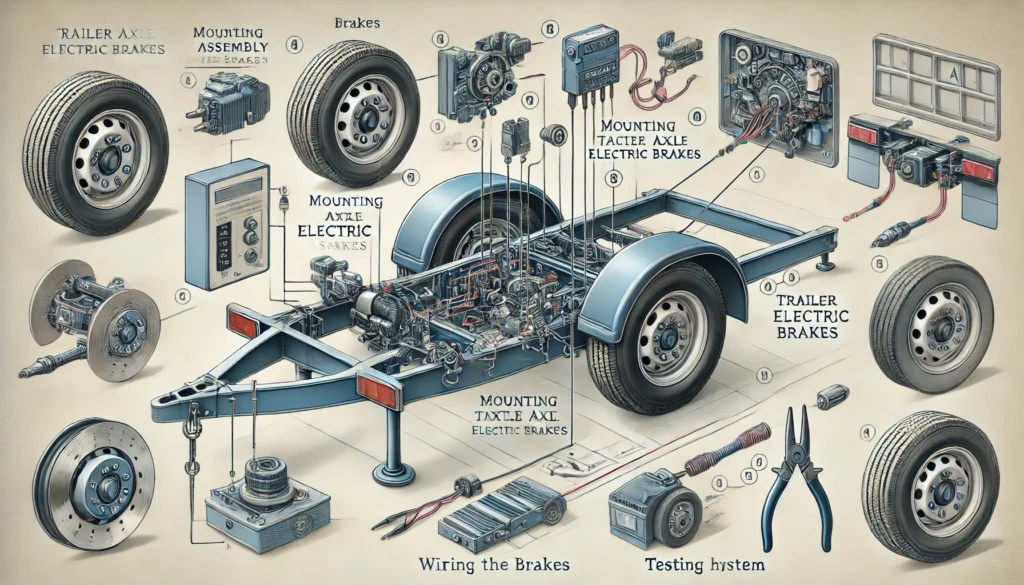Understanding trailer axle electric brakes is essential for anyone involved in towing, whether for recreational or commercial purposes. These brakes provide the necessary stopping power to ensure that your trailer stops safely and efficiently, especially when carrying heavy loads. In this comprehensive guide, we will delve into the key aspects of trailer axle electric brakes, including their installation, maintenance, and benefits.

What Are Trailer Axle Electric Brakes?
Trailer axle electric brakes are a type of braking system installed on the axle of a trailer. Unlike hydraulic brakes, which use fluid pressure, electric brakes rely on electrical signals from the towing vehicle to activate the brakes on the trailer. This system allows for synchronized braking between the trailer and the towing vehicle, ensuring smoother stops and better control.
How Do Trailer Axle Electric Brakes Work?
The functionality of electric brakes revolves around a few critical components:
- Brake Controller: This device, installed in the towing vehicle, sends an electrical signal to the trailer brakes when the driver applies the brakes.
- Wiring Harness: This set of wires carries the electrical signal from the towing vehicle to the trailer’s brake assemblies.
- Brake Assemblies: These include the brake drums, shoes, and electromagnets. When the brake controller sends a signal, the electromagnet engages, causing the brake shoes to press against the brake drum, slowing the trailer.
Benefits of Trailer Axle Electric Brakes
- Enhanced Safety: Electric brakes improve the stopping power of the trailer, reducing the risk of accidents.
- Smoother Braking: With electric brakes, the trailer brakes simultaneously with the towing vehicle, ensuring smoother and more controlled stops.
- Legal Compliance: In many regions, trailers above a certain weight are required to have electric brakes.
How to Install Trailer Axle Electric Brakes
Installing electric brakes on your trailer axle involves several steps:
Step 1: Gather the Necessary Tools and Parts
Before beginning the installation, ensure you have the following:
- Electric brake kit (including brake drums, shoes, and electromagnets)
- Brake controller
- Wiring harness
- Jack and jack stands
- Lug wrench
- Screwdrivers and pliers
- Wire connectors and electrical tape
Step 2: Prepare the Trailer
- Park the trailer on a stable, flat surface and secure it with wheel chocks.
- Use a jack to lift the trailer and place jack stands under the frame for safety.
- Remove the wheels to access the axle and brake assemblies.
Step 3: Install the Brake Assemblies
- Remove the existing hub from the axle by loosening the spindle nut.
- Slide the new brake drum onto the spindle, ensuring it fits snugly.
- Mount the brake backing plate to the axle flange and secure it with bolts.
- Make sure the brake shoes and electromagnets are correctly aligned within the drum.
Step 4: Wiring the Brakes
- Run the wiring from the brake controller in the towing vehicle to the trailer’s brake assemblies.
- Connect the wires from the controller to the corresponding wires on the brake assemblies. Ensure that the connections are secure and protected with electrical tape.
- Check the grounding of the brake assemblies to avoid any electrical issues.
Step 5: Test the Brakes
- With the trailer still on jack stands, manually spin the wheels and apply the brake controller to see if the wheels stop smoothly.
- Reattach the wheels and perform a road test at low speed to ensure the brakes are functioning correctly.
Maintenance Tips for Trailer Axle Electric Brakes
- Regular Inspections: Periodically check the brake shoes, drums, and wiring for signs of wear or damage.
- Lubrication: Apply brake lubricant to the moving parts to prevent corrosion and ensure smooth operation.
- Brake Controller Calibration: Adjust the brake controller settings as needed to achieve the desired braking force.
Conclusion
Installing and maintaining trailer axle electric brakes is crucial for safe and effective towing. By following the steps outlined in this guide, you can ensure that your trailer is equipped with reliable brakes that will enhance your control and safety on the road. Regular maintenance will keep your braking system in top condition, providing you with peace of mind during every journey.
